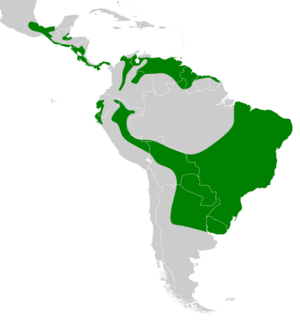Striped owl facts for kids
Quick facts for kids Striped owl |
|
|---|---|
 |
|
| Conservation status | |
| Scientific classification |
|
| Kingdom: | Animalia |
| Phylum: | Chordata |
| Class: | Aves |
| Order: | Strigiformes |
| Family: | Strigidae |
| Genus: | Asio |
| Species: |
A. clamator
|
| Binomial name | |
| Asio clamator (Vieillot, 1808)
|
|
 |
|
| Script error: The function "autoWithCaption" does not exist. | |
| Synonyms | |
|
Pseudoscops clamator |
|
Script error: No such module "Check for conflicting parameters".
The striped owl (Asio clamator) is a cool bird with special 'ear' tufts on its head. It has a brownish-white face with a black edge, a black beak, and cinnamon-colored eyes. Its wings are shorter and rounder than many other owls. The top part of its body is cinnamon-colored with thin black lines and stripes. Its belly is light brown with darker streaks. This owl lives in South America and parts of Central America.
Contents
Naming the Striped Owl
Scientists give every animal a special two-part name, like a first and last name. This helps everyone around the world know which animal they are talking about.
The striped owl's scientific name is Asio clamator. A French bird expert named Louis Pierre Vieillot first described this owl in 1808. He gave it the name Bubo clamator. The word clamator comes from Latin and means "shouter." This might be because of the sounds the owl makes!
Over time, scientists have learned more about owls. They used to think the striped owl belonged to other groups, like Rhinoptynx or Pseudoscops. But now, after studying its DNA, they agree it belongs in the Asio group with other similar owls.
What Does It Look Like?
The striped owl is a medium-sized owl. It has long feathers on its head that look like ears, which are very easy to spot.
These owls are about 30 to 38 centimeters (12 to 15 inches) long. They usually weigh between 320 and 546 grams (11 to 19 ounces). That's about as much as a can of soup!
Their head, back, wings, and tail are brown. They have black stripes and small marks all over these parts. Their belly is a light, yellowish-brown color. It has strong black streaks on its chest. The owl's face is pure white with a thin black border around it.
Where Do Striped Owls Live?
The striped owl lives in many parts of South America and Central America. It can be hard to find them because they are active at night.
They are found in countries like Argentina, Brazil, Colombia, Costa Rica, Mexico, and Venezuela. They also live in many other countries in these regions.
Striped owls like to live in different kinds of places. You might find them near rivers in forests, in wet marsh areas, or in open grassy fields. They also live in tropical rainforests. They can live from sea level all the way up to high mountains, even above 1,600 meters (about 5,200 feet).
Is the Striped Owl Safe?
The striped owl lives across a very large area. Scientists believe there are many of these owls, and their numbers are staying steady.
This owl does not face any big dangers right now. Because of this, a group called the IUCN says the striped owl is of "least concern." This means they are not worried about this owl becoming endangered anytime soon.
 | Roy Wilkins |
 | John Lewis |
 | Linda Carol Brown |



